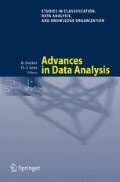Abstract
The aim of this paper is the critical discussion of different data mining methods in the context of the demand-oriented development of bachelor and master study courses at german universities. The initial point of the investigation was the question, to what extent the knowledge concerning the selection of the so-called “Fachkernkombinationen” (major fields of study) at the Fakultät Wirtschaftswissenschaften of the Technische Universität Dresden, could be used to provide new important and therefore demand-oriented impulses for the development of new bachelor and master courses. In order to identify these entrainment combinations it is obvious to examine the combinations of the major fields of study by means of different data mining methods. Special attention applies to the association analysis which is classical used within the ranges trade (basket analysis) or e-business (web content and web Usage mining) — an application in the higher education management is missing until now.
Access this chapter
Tax calculation will be finalised at checkout
Purchases are for personal use only
Preview
Unable to display preview. Download preview PDF.
References
BOLLINGER, T. (1996): Assoziationsregeln — Analyse eines Data Mining Verfahrens. Informatik-Spektrum, 19, 257–261.
BRÜGGEMEIER, M. (2004): Public Management. In: A. Hanft (Ed.): Grundbegriffe des Hochschulmanagements. Universitätsverlag Webler, Bielefeld.
GÖPFRICH, H. (2002): SRM Student Relationship Management — Web-unterstützte Kundenorientierung im Bildungsbereich. In: B. Britzelmaier, S. Geberl and S. Weinmann (Eds.): Der Mensch im Netz-Ubiquitous Computing, 4. Lichtensteiner Wirtschaftsinformatik-Symposium, FH Lichtenstein, B.G. Teubner, Stuttgart/Leipzig/Wiesbaden.
GOLA, P. and SCHOMERUS, R. (2005): BDSG: Bundesdatenschutzgesetz, Kommentar. Beck, München.
LUAN, J. (2004): Data Mining in Higher Education. SPSS White Paper, URL: 290/http://193.99.40.183/upload/1122641492_Data.
NECKEL, P. and KNOBLOCH, B. (2005): Customer Relationship Analytics-Praktische Anwendung des Data Mining im CRM. dpunkt.verlag, Heidelberg.
SPIEWAK, M. (2005): Studenten erproben die Macht. Die Zeit, 21, 19.05.2005.
TAN, P.-N., STEINBACH, M. and KUMAR, V. (2006): Introduction in Data Mining. Addison Wesley, Boston.
TÖ PFER, A. (2004): Vision und Realität von CRM-Projekten. In: H. Hippner and K.D. Wilde (Eds.): Management von CRM-Projekten, Gabler, Wiesbaden.
ZANGER, C. (2005): Universitätsmarketing-Chancen eines ganzheitlichen Konzeptes am Beispiel der TU Chemnitz. Vortrag ‘Von der Öffentlichkeitsarbeit zum Hochschulmarketing’, TU Dresden, 10.06.2005.
Author information
Authors and Affiliations
Editor information
Editors and Affiliations
Rights and permissions
Copyright information
© 2007 Springer-Verlag Berlin Heidelberg
About this paper
Cite this paper
Schönbrunn, K., Hilbert, A. (2007). Data Mining in Higher Education. In: Decker, R., Lenz, H.J. (eds) Advances in Data Analysis. Studies in Classification, Data Analysis, and Knowledge Organization. Springer, Berlin, Heidelberg. https://doi.org/10.1007/978-3-540-70981-7_56
Download citation
DOI: https://doi.org/10.1007/978-3-540-70981-7_56
Publisher Name: Springer, Berlin, Heidelberg
Print ISBN: 978-3-540-70980-0
Online ISBN: 978-3-540-70981-7
eBook Packages: Mathematics and StatisticsMathematics and Statistics (R0)

